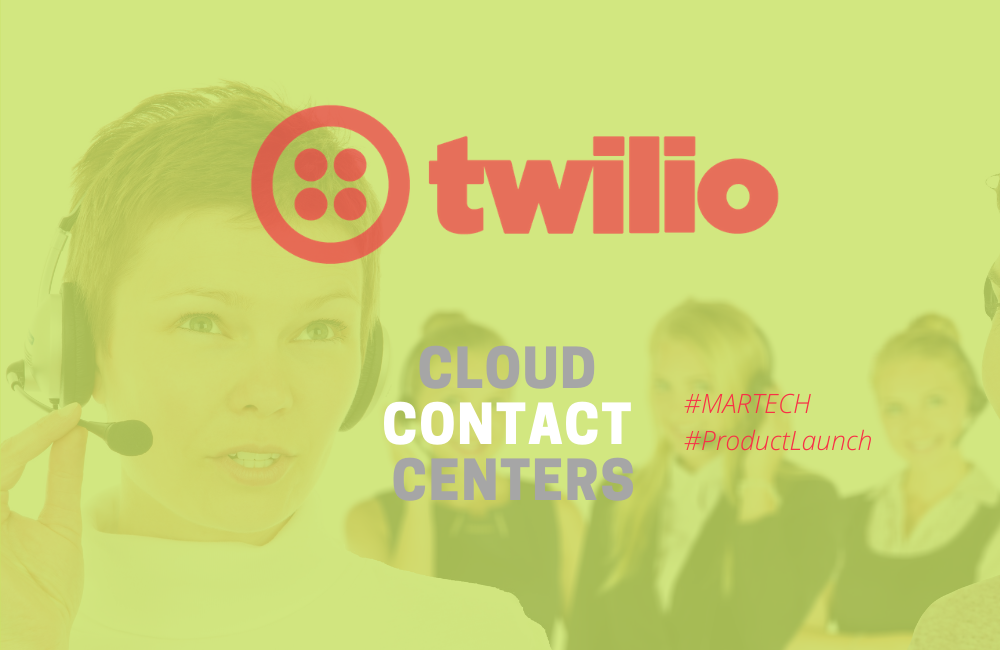Customer intelligence and cloud contact centers have come together as a novel science in solving major challenges that the marketers face during a pandemic. Leading Cloud communication platform Twilio has made significant enhancements to its modern contact center, bringing new mobile innovation to enable the remote, agile workforce with state-of-the-art customer intelligence. It is an unchallenged fac today that customer intelligence fuels the future of customer engagement across all industries, and this intelligence is driving major transformation from the physical to virtual space.
Twilio Enhancements Focus to Serve Digital Engagement, Software Agility, and Cloud Scale
Twilio, the leading cloud communications platform, announced platform enhancements that help fast forward companies’ digital acceleration. In recent months, 97% of enterprises have accelerated their digital transformation efforts in response to COVID-19. Companies are spending more and faster in their digital communications strategy. They have sped up by an average of six years. One of the most startling observations made by Twilio is the increase in demand, powering nearly one trillion human interactions in the past year driving essential online engagements between brands and customers. As enterprises across every industry turn to the platform to deliver the essential engagement experiences they need to reach their customers, the role of Cloud contact centers has also significantly got bigger.
Accelerate Digital Transformation Plans to Serve Customers
“Faced with an entirely new reality over the past six months, enterprises have been forced to accelerate their digital transformation plans to serve their customers,” said Jeff Lawson, CEO and co-founder of Twilio.
By making communications a part of every software developer’s toolkit, Twilio is enabling innovators across every industry — from emerging leaders to the world’s largest organizations — to reinvent how companies engage with their customers.
Jeff added,“Many are turning to Twilio because the platform delivers three things that have become immediately essential — digital engagement, software agility, and cloud scale. We’re excited to announce new products at SIGNAL that allow enterprises to build the solutions that will become the standard for customer engagement in the future.”
“Communication is critical to keep travelers informed throughout their journey with Delta, but it’s even more important as we navigate COVID-19,” said Ed Bastian, CEO of Delta Air Lines. “Twilio has enabled us to communicate updates and new standards to our 200 million customers, 24 hours a day, seven days a week. While our people continue to deliver best-in-class service, technology helps us communicate and continue to operate safely, comfortably and at scale.”
At SIGNAL 2020, Twilio announced key enhancements to its Modern Cloud Contact Center platform. These are listed as follows:
New Digital Engagement Channels That Power the Shift From Physical to Digital
Industries that have historically relied on in-person experiences to build brand loyalty are turning to digital engagement channels to create the same one-on-one connection online. Twilio’s sent and received messages nearly doubled in the first half of this year compared to the first half of 2019.
During the same period, developers using Twilio to access the WhatsApp Business API more than doubled. In May 2020, Twilio SendGrid surpassed three trillion processed emails, sending an average of 2.5 billion emails per day this year.
Twilio’s research found that 95% of businesses said they expect their organization to find new ways of engaging customers as a result of COVID-19 with 92% of organizations looking to expand their digital communication channels. Perhaps no digital channel has been accelerated by this transition as much as real-time video. In the early days of the pandemic, companies rushed to deploy short-term emergency solutions to enable video.
Now they are looking to developers to build long term video solutions that are more tailored and integrated for optimal user experience, fuelling a more than 500% increase in daily Twilio Video usage since COVID-19 hit.
Traditionally millions of developers have turned to WebRTC as an open framework to build new video use cases, only to struggle with the ongoing time and cost to build all the services and infrastructure that support WebRTC applications.
To revolutionize this, Twilio Video launched Twilio Video Web RTC Go, a free toolkit that eliminates the complexity of building on top of WebRTC, enabling developers and companies to simply and quickly create and launch one-to-one video applications.
Modern Contact Center and Mobile Innovation That Enables the Remote, Agile Workforce
Today’s socially distant world demands that organizations design their workforces to be able to serve customers under any circumstances from anywhere. Businesses have seen no greater acceleration to digital than in the contact center where organizations needed to quickly move to the cloud to support remote work. Twilio’s Cloud Contact Center, Twilio Flex is powering this agile workforce movement.
Twilio Flex, which calls Lyft, Marks & Spencer and Shopify customers, has added more than 100 new features since its launch on the SIGNAL stage in 2018. Today it expands the capability of its platform with the announcement of the Twilio Flex Ecosystem — giving organizations access to more than 30 validated partner solutions from partners such as Google, Salesforce, Zendesk, and Calabrio to help businesses accelerate their contact center transformations. Twilio also recently announced the company’s first Global Systems Integrator partnership with Deloitte Digital.
What’s Driving Agile Workforce Trends?
Due to COVID-19 pandemic, 80% of the global workforce who are deskless.
Many of these field workers use their own personal devices to communicate with customers — introducing privacy concerns and making it difficult for businesses to keep a record of communication with their customers.
Launching Twilio Frontline
To serve this decentralized workforce, Twilio today announced Twilio Frontline — a mobile application that allows field workers to seamlessly and securely engage directly with customers from their personal devices.
The app routes incoming and outgoing customer conversations from WhatsApp, SMS/MMS, and web chat with more channels on the horizon, to a single mobile app on an available employee’s personal device. As a mobile app, Twilio Frontline gives every employee the communication tools they need to efficiently answer questions, solve problems, and build customer relationships without requiring businesses to develop their own application. Learn more about the Frontline private beta here.
Customer Intelligence That Fuels the Future of Customer Engagement
Every business is looking to better understand their customers yet building a single view of a customer’s journey is difficult as the data is often spread out across different products and systems and accessed through disparate interfaces and formats. Twilio’s platform presents businesses with a unique purview across all channels to break down silos and deliver customer intelligence that leverages multi-channel customer interaction data — ultimately providing one single view of the customer experience.
Twilio Event Streams
At SIGNAL, Twilio introduced Event Streams — a single API that aggregates data from all Twilio powered experiences — Voice, SMS, Super SIM, TaskRouter, and other services — enabling real-time monitoring and reporting across every communication channel. This is the first step in Twilio’s efforts to optimize how developers can access, understand, and consume the highly valuable customer interaction data from events that the Twilio platform generates to improve engagement and business outcomes.
As of August 2020, millions of developers around the world have used Twilio to unlock the magic of communications to improve any human experience. Twilio has democratized communications channels like voice, text, chat, video, and email by virtualizing the world’s communications infrastructure through APIs that are simple enough for any developer to use, yet robust enough to power the world’s most demanding applications.












Comments are closed.